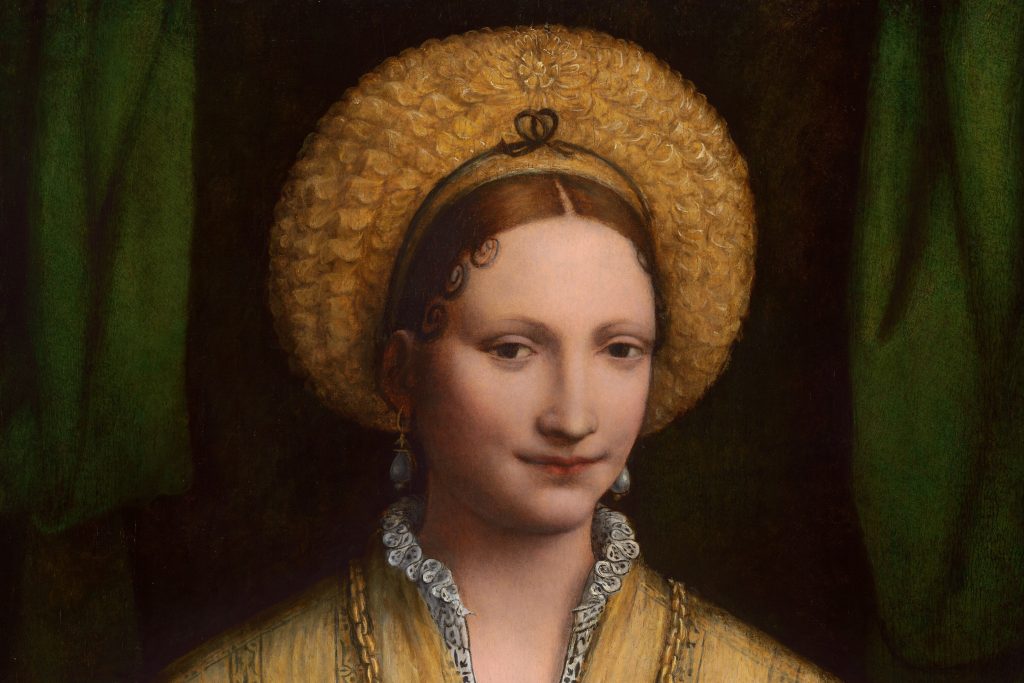
Bernardino Luini, Milanese, c. 1480 – 1532 , “A Portrait of a Lady”, National Gallery
The Portrait of a Lady is a novel by Henry James, first published as a serial in The Atlantic Monthly and Macmillan’s Magazine in 1880–81 and then as a book in 1881. It is one of James’s most popular novels and is regarded by critics as one of his finest. I picked it up recently after once again rejecting James Joyce’s Ulysses for being insipid and unreadable (more on that perhaps in a different post). After confronting Joyce’s vain, meaning-free language, Henry James’ writing style was very pleasant and quite thought-provoking. Like Joyce, James is wordy, but his sentence construction conveys his thoughts clearly, as opposed to Joyce, whose experimental prose seems to primarily convey feeling and sentiment and often resists anything that has the appearance of truth. Henry James, however, is very interested in his characters and their depth and uses them to convey hard truths about life. This is my opinion, of course and it is your right to disagree!
In this book, James brings to the surface the conflict in his time between the spirit of independence and social norms. Throughout the book, James uses America and Europe as symbols of these qualities. America, of course at the time was a symbol of innocence and individualism. Europe, on the other hand, was revealed as a picture of sophisticated tradition and social conventions. Things have changed quite a lot since the late 1800’s, and a current author might not choose America and Europe to illustrate this point any longer, but there are plenty of targets available. Independence is viewed differently in the modern west than it was in Henry James’ time and while it may have been surprising and refreshing to read about a bright, independent young woman in the late 1800’s, in the modern west, it would not capture the same level of interest, because the notion of pursuing independent thinking is encouraged by society. Even in countries touched by communal or Marxist traditions, the idea of being an independent thinker is generally accepted. In both types of societies, though, I’d submit that the actual practice of independent thinking is often discouraged through various suppression techniques and fashions. That said, we see our main character, Isabel Archer, early in the novel and her notions of independence and the unfettered pursuits of experience stand out from the European formality and fatalism that surrounds her. The reader finds themselves excited to see her challenge and conquer these societies with her intelligence and energy. All goes well for her and she comes into a small fortune at the death of an Uncle and the intervention of a well-intentioned cousin. Isabel demonstrates her freedom and desire to follow her own unique path by rejecting marriage proposals from a British Lord and an American businessman, both of whom meet her and love her before her fortune is made.
To avoid spoilers, what we see next in the novel confirms many prejudices about how one’s fortune can negatively impact not just a life, but also one’s true independence. Isabel finds herself a target of scheming by unscrupulous expatriates and life crashes down hard on her. We see very complex characters, one is truly Machiavellian and evil in his self-regard and vanity. Another chooses to demonstrate proper behavior in society to set up complex social networks and schemes that solve her money problems (and also other, more challenging issues). One of my favorite characters is Isabel’s American friend, Henrietta, a direct and somewhat nosy news reporter. Henrietta grows significantly during the novel and becomes a true friend to Isabel by the end.
During the unfolding of the novel’s plot, we find Isabel becoming a loving step-mother to young Pansy Osmond, who looks to the reader as what we might expect a convent-raised wallflower might look. By all appearances, she has no imagination and has been trained to be passive and obedient to her manipulative father. To our modern sensibilities, her character for much of the book is disappointing, but when we are able to see a bit deeper beneath the surface, we find that our modern western prejudices have betrayed us a bit. Perhaps Pansy is more complex that we thought? This is the thought that I might close with because The Portrait of a Lady has much in it to trigger our modern fashions. Many will be unable to get beyond this, as our culture maintains just as strong a hold on our imaginations – and is as insidious – as the late 1800’s European behaviors that we have learned hostility towards. We moderns unfairly judge many of the characters of this book for actions and behaviors which are merely manifestations of their culture, but we are challenged by other characters whose narcissism and manipulation look like the evil that we often choose to paint over.






